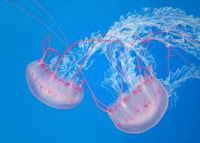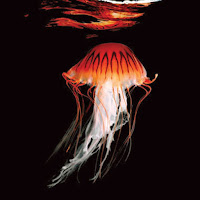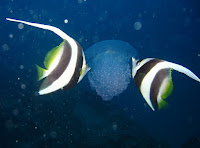October 25, 2011 for the latest animal attacks news click on the link below
Jellyfish
What types of jellyfish are found in our oceans here?
The Moon jelly
 |
| Blue Angels (Anges Bleus) |
How do Jellyfish sting and what do they eat?
What would happen when all what you were thinking for was the gold medal in a triathlon only to see jellyfish tentacles trailing behind the swimming bell. Jellyfish are of many varieties and sizes. The most dangerous jellyfish can be found in many parts of the world and at different time and places both in the deep and shallow waters of the all world’s ocean.
 At about 60 centimeters in length, the lion's mane jellyfish tentacles can reach around five meters long. The jellyfish tentacles have thousands of stinging cells that when they come into contact with other foreign bodies or while in danger will use its defense mechanism to inject toxins to kill tiny animals or stun the. This is always the case where jellyfish are responsible for the stings that swimmers are inflicted with feel.
At about 60 centimeters in length, the lion's mane jellyfish tentacles can reach around five meters long. The jellyfish tentacles have thousands of stinging cells that when they come into contact with other foreign bodies or while in danger will use its defense mechanism to inject toxins to kill tiny animals or stun the. This is always the case where jellyfish are responsible for the stings that swimmers are inflicted with feel. Jellyfish mode of food intake.
If you were a small fish in the ocean and after being stung, there is always less chance of survival and survival of the fittest and the scrambling for food in the ocean is always something to recon with.
Having been paralyzed by the jellyfish sting, the jellyfish tentacles would transport you up the central tentacles which is heart-shaped and contains abundant gastric pouches in the swimming bell where you would be digested. Like any other sea creatures, jellyfish are good swimmers and feed without end as all jellyfish are prodigious predators. As people say, many hands make light work, the jellyfish can search food and eat with out being bothered of who is in front or behind as they don’t have eyes and primarily depend on their tentacles which work independently to hold food and take it for processing. The broad tentacles spectrum gives the jellyfish a very large surface area to search for food and get hold of it.
Jellyfish mostly known to feed on tinny crustaceans called copepods that are available in any see or ocean while their counterparts who live if fresh water consume minnows, anchovy eggs, worms, mosquito larvae, and comb jellies, so they would seldom be without something to eat.
The sting-masters of the sea, Jellyfish are usually passive drifters who use their tentacles to dredge up small prey. However, anyone who becomes entangled with a jellyfish will experience degrees of pain from a nasty nip to excruciating pain, depending on the species. The box jellyfish is one of the most venomous marine creatures in the world; a sting can kill a man within minutes and most fatalities occur following a brush with a toxic jelly like this.
Responsible for: Jellyfish are responsible for about 100 fatalities a year.
Jellyfish habitat: Most of the dangerous jellyfish are found in Northern Australia, Papua New Guinea, Malaysia, Indonesia, the Philippines, North American coast, Thailand and Vietnam.
Method of dispatch: When a jellyfish wants to attack, the jellyfish unwinds its coiled stinging tentacles. With a split of a second, the jellyfish with great energy, fires them at the victim and then pumps their venom to paralyse the recipient, usually manifesting itself as cardiac arrest in humans.
Useful avoidance techniques: At any time when you find yourself swimming in an area where there are known jellyfish, you should wear a sting-suit. However, if you are stung, get out of the water pronto and apply vinegar to any stings remaining embedded in the flesh to remove the venom, then brush or lift off using a credit card, stick or similar.

The Dangerous Hippopotamus in the African Great Lakes and Rivers
The biggest African Nile crocodile in the world
The Black, the Brown, and the GRIZZLY BEARS
TIGERS
 |
| Moon jellyfish |
 |
| Australian jellbox fish venomous kill in less than 20minutes |
 |
| Pulau Stinless jellyfish |

 |
| White sported |
 |
| Amazing Jellyfish |
 |
| Crown Jellyfish |
 |
| Purple stripped jellyfish |
 |
| transparent jellyfish |
 |
| Flower hat Jellyfish |
 |
| Purple-Striped Jellyfish, chrysaora colorata, |
 |
| Purple-Striped Jellyfish, Southern California |
The Red Elephant and the Land of a Million Elephants
The Dangerous Hippopotamus in the African Great Lakes and Rivers
The biggest African Nile crocodile in the world
The Black, the Brown, and the GRIZZLY BEARS
TIGERS
















































